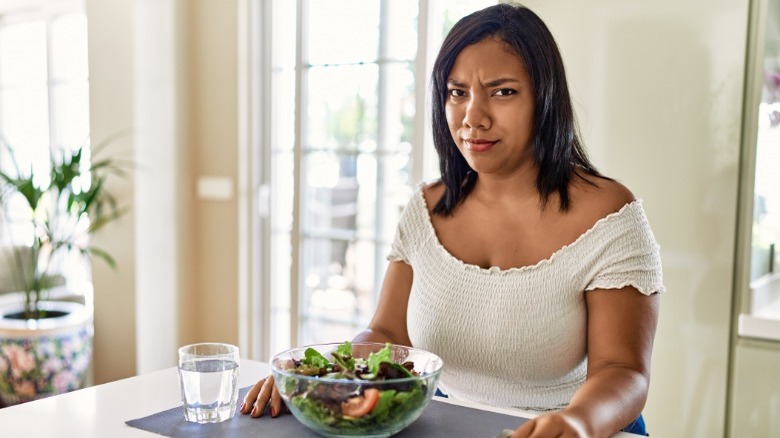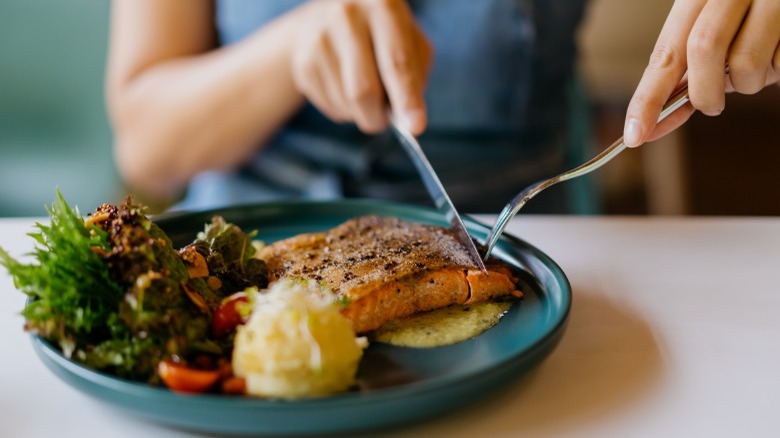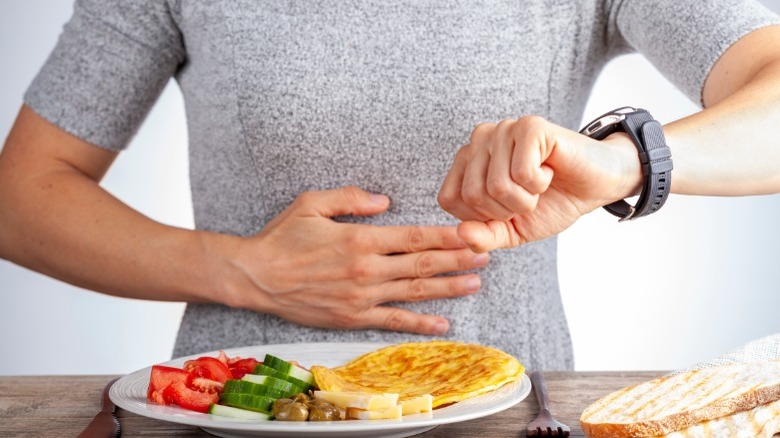Dietitian Shares Dos And Dont's Of Boosting Fertility Through Food (Spoiler: Don't Expect Miracles) - Exclusive
Social media is filled to the brim with fertility diet tips and tricks — but just how effective are any of them? Despite what sex ed classes taught us, getting pregnant isn't always as simple as ... well, we'll spare you the birds and the bees talk. Bottom line: for many couples, conceiving can be a lengthy process — and there are a number of reasons why. Per Healthline, conditions like PCOS and endometriosis can place additional hurdles in the way of parenthood. On top of that, there's also the reality that everyone's journey to conception is unique.
One thing most experts seem to agree on, however, is that optimal health makes for better odds. And, while many health conditions are often out of our control, one thing we can get intentional about is our nutrition. It makes sense, then, why social media is flooded with fertility nutrition pointers — but it's always a good idea to proceed with caution before taking any kind of diet as gospel. Women.com spoke exclusively with Brooke Boskovich, MS, RD, LDN at The Fertility Dietitian for clarity on what's true, what should be taken with a grain of salt, and whether or not a fertility diet even exists.
Don't get caught up on a specific diet (especially restrictive ones)
If all the advice you're seeing online is feeling a little overwhelming, here's your sign to breathe easy. As Brooke Boskovich exclusively told Women.com, "There is no such thing as one optimal fertility diet." Granted, that's not to say there aren't guidelines that could improve your overall health. However, Boskovich stresses that a balanced approach will always beat out a restrictive one. "Cutting out food groups typically leads to much more harm than good for gut health, ability to eat enough and even just the added stress of 'what to eat' to support fertility." What's more, Boskovich added that if anything, being overly restrictive could actually be hindering your baby-making efforts, going so far as to call it, "A recipe for depleting your fertility, not supporting it."
Choosing balance over restriction is a sentiment that dietitians and fertility experts share, with Well + Good reporting that there is no specific food that will help you get pregnant. Chief takeaway: there's no miracle diet, nor is there any need to quit eating anything that hasn't been deemed a fertility superfood.
Do be sure to include all the necessary nutrients, instead
Boosting fertility through nutrition might not require a diet of "superfoods" alone — but it's certainly worthwhile to add nutrient-rich foods to your meals. Speaking exclusively to Women.com, Brooke Boskovich explained that most of her clients are not getting enough carbs or protein in their diet. She also pointed out how that could cause problems, given both food groups, "provide many minerals and vitamins that are crucial for fertility." So, her advice? "Think eggs, wild-caught salmon, berries, citrus, beets, dark leafy greens, and grass-fed beef." And, no, you're not imagining it: they're all easy-enough add-ons, generally free from "superfood" hype.
A note to anyone considering a supplement to get those essential nutrients: think again. Medical News Today reports that there is not enough evidence to support the claims that fertility supplements work. "We can't out-supplement poor nutrition and lifestyle habits," Boskovich cautioned. Noting that supplements are just that — an add-on — Boskovich also pointed out that it's easier to get what we need when we look to food for our necessary nutrients, first and foremost. "Mother nature is way smarter than we are ... she already has all the nutrients in appropriate forms, and with the nutrient buddies they need to be used best in our bodies."
Do be mindful that this is not a quick fix
Another pointer Brooke Boskovich wants anyone planning to conceive to keep in mind? This isn't a quick fix. While adding nutritious foods into your diet is important, Boskovich exclusively told Women.com that this needs to happen consistently to make a difference. "It's not as simple as adding one food," she warned. Taking things a step further, she also pointed out that even eating those nutrient-dense foods every day is just part of a healthy, fertility-friendly diet. Reason being? "Most women go into their childbearing years with inadequate stores of nutrients that are super important for egg quality, hormone production, efficient detox and so much more," she said. Given just how important those nutrients are for everything from conception to a healthy pregnancy, anyone hoping to see big changes will need to make big changes.
That said, just like the advice that a fertility diet doesn't require huge restrictions or super expensive superfoods, there's a measured approach to making said adjustments. Dietician Tracy Lockwood Beckerman told Well + Good that it all starts with baby steps: "Make small changes to your daily routine to make it more fertility-forward, such as adding more plant-based proteins instead of meat proteins, sprinkling nuts or seeds into your morning parfait instead of granola, or eating more seafood."
Don't be surprised when you see positive changes in your overall health
It bears mentioning that even a super healthy diet and routine don't guarantee you'll fall pregnant immediately. In fact, according to Verywell Family, in the absence of medical conditions that could impact conception, it can take a couple under 35 up to a year of trying to conceive before needing to see a specialist (couples over 35 should see an expert after six months).
Even so, Brooke Boskovich told Women.com exclusively that the benefits of a nutritious diet for your overall health shouldn't be discounted — especially since most women aren't getting the nutrients they need, even before trying to get pregnant. So, when should one expect to see changes after getting more intentional in that department? According to Boskovich, the effects of a healthier lifestyle begin to kick in in a matter of a couple weeks.
As for the fertility benefits of said lifestyle changes, Boskovich explained that it takes between 90 and 100 days for a follicle to fully mature before ovulation. But, she added, "It's not uncommon to see improvements in cycle health along the way!" Getting healthier for yourself, and improving your fertility odds? It's a win-win.
Do see a dietitian if it'll set your mind at ease
If waiting a year to see a specialist feels too long, or if you're still not sure you have everything you need, nutrient-wise, there's no harm in seeing a dietitian with an expertise in fertility. In fact, as Brooke Boskovich exclusively told Women.com, doing so will always be a better route to take than following social media advice.
"Unfortunately, there is a lot of noise out there on 'What to eat for fertility' — much of which isn't evidence-based," Boskovich acknowledged. Plus, by speaking to a professional who knows you and your personal needs, she added, it's easier to take the right approach from the start. The benefits there are obvious — why waste precious time if there's another option? "Seeking guidance from a Fertility Dietitian can save you a lot of heartache."
At the end of the day, nutrition plays a role in every part of the pregnancy process, from conception to delivery, and will play a role in your postpartum care and recovery, too. Don't fall for the fads, and do what's best for your own body.





